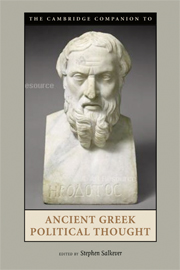Book contents
- Frontmatter
- Introduction
- 1 Homer and Political Thought
- 2 Foundings vs. Constitutions: Ancient Tragedy and the Origins of Political Community
- 3 Most Favored Status in Herodotus and Thucydides: Recasting the Athenian Tyrannicides through Solon and Pericles
- 4 Thucydides and Political Thought
- 5 “This Way of Life, This Contest”: Rethinking Socratic Citizenship
- 6 The Political Drama of Plato’s Republic
- 7 Practical Plato
- 8 Reading Aristotle’s Nicomachean Ethics and Politics as a Single Course of Lectures: Rhetoric, Politics, and Philosophy
- 9 Lived Excellence in Aristotle’s Constitution of Athens: Why the Encomium of Theramenes Matters
- 10 The Virtue Politics of Democratic Athens
- 11 Origins of Rights in Ancient Political Thought
- 12 The Emergence of Natural Law and the Cosmopolis
- Select Bibliography
- Index
5 - “This Way of Life, This Contest”: Rethinking Socratic Citizenship
Published online by Cambridge University Press: 28 September 2009
- Frontmatter
- Introduction
- 1 Homer and Political Thought
- 2 Foundings vs. Constitutions: Ancient Tragedy and the Origins of Political Community
- 3 Most Favored Status in Herodotus and Thucydides: Recasting the Athenian Tyrannicides through Solon and Pericles
- 4 Thucydides and Political Thought
- 5 “This Way of Life, This Contest”: Rethinking Socratic Citizenship
- 6 The Political Drama of Plato’s Republic
- 7 Practical Plato
- 8 Reading Aristotle’s Nicomachean Ethics and Politics as a Single Course of Lectures: Rhetoric, Politics, and Philosophy
- 9 Lived Excellence in Aristotle’s Constitution of Athens: Why the Encomium of Theramenes Matters
- 10 The Virtue Politics of Democratic Athens
- 11 Origins of Rights in Ancient Political Thought
- 12 The Emergence of Natural Law and the Cosmopolis
- Select Bibliography
- Index
Summary
When I teach Plato, I begin, as many of us do, with the dialogues surrounding the trial and death of Socrates. And I find that for the most part my students enthusiastically embrace what they take to be Socrates' urging - to continually question our beliefs and our claims to know. Indeed, they understand this to be what their college education involves, and to a point I agree with them. But surely that is not all education involves. As Eva Brann says, “the claim, so often made in prose and poetry that the quarry is nothing and the quest everything, turns the pursuit of truth into a mere exercise, which is, for all its strenuousness, rather idle. Why look when one does not mean to find?”
Whatever else we can say about Socrates, it is surely the case that for him the pursuit of truth was no “mere exercise.” Yet my students' view of Socrates as emphasizing questioning above all has its echoes in contemporary scholarship. Let me take as one example Dana Villa's conception of “Socratic citizenship,” which emphasizes the critical, dissident force of Socratic interaction. Here Socratic elenchus is not so much a method of philosophical investigation as a method of inducing perplexity; no one ever figures out what justice or piety really is. Socrates' activities, Villa argues, are best characterized by the notion of “dissolvent rationality,” where what is dissolved through the use of reason is the lazy or dogmatic assumption that the beliefs we hold are true. The point of the perplexity that results is a slowing down, a “greater hesitancy in action” that may help us avoid injustice.
- Type
- Chapter
- Information
- The Cambridge Companion to Ancient Greek Political Thought , pp. 126 - 155Publisher: Cambridge University PressPrint publication year: 2009
- 2
- Cited by

